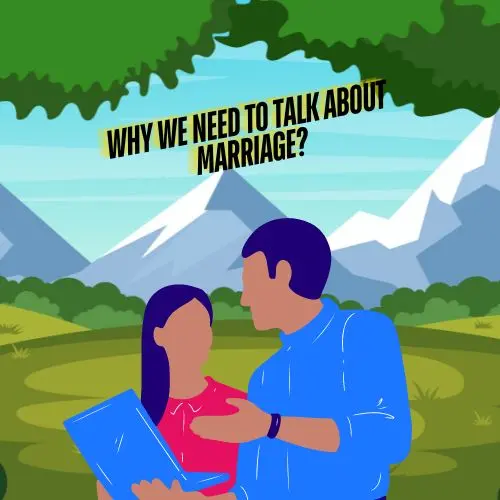Introduction
Marriage is one of the most important establishments in society, but it is also among the less recognized. Our view of marriage changes with the evolution of societies and cultures. By having open and thoughtful conversations on this subject, we can build up interpersonal relations as well as family and community bonds. This article will discuss several pressing issues surrounding marriage using a blend of factual data, individual encounters, and opinions from specialists.
| Marriage Statistics in the United States |
|---|
| – The median marriage is 30.5 for men and 28.6 for women in 2022. Reference: theknot |
| – Over 43% of marriages in the U.S. end in divorce. Ref: Forbes |
| – Roughly 36% to 39% of American adults have never been married. Ref : by 2019 39% of men were unpartnered, compared with 36% of women |
Marriage is Evolving

The definition and purpose of marriage has changed greatly over the centuries. In many ancient societies, marriage was viewed primarily as an economic contract between families to produce offspring and consolidate wealth or land. Love and emotional fulfillment between partners were not the focus.
While romance and commitment are now cited as the main reasons people choose to marry, societal expectations of marriage continue to evolve. For example, dual-career couples often delay marriage and children to establish themselves professionally. Cohabitation and living together outside of marriage have also become mainstream alternatives.
Singlehood is no longer seen as a problem to be solved either. With more social freedom and financial independence, being single by choice is an acceptable lifestyle for many. Others prefer long-term committed relationships without the legal bond of marriage.
According to clinical psychologist Dr. Gary Brown, these shifts reflect marriage being redefined from an institution to a personal choice and partnership:
“Marriage is no longer something people felt obligated to do for tradition or religion alone. Now people marry because they want to make a conscious commitment to their partner through good times and bad.”
However, ensuring commitment and addressing modern relationship challenges requires ongoing communication within partnerships and communities. Issues like blended families after divorce or infidelity need open discussion to foster understanding.
Benefits of Talking About Marriage

Having critical yet compassionate conversations about marriage can help strengthen relationships in several important ways:
Promotes Shared Expectations
Discussing life goals, responsibilities, finances, and intimacy helps couples align their expectations. This reduces disillusionment down the road when challenges emerge.
Builds Deeper Connections
Talking openly makes others feel heard and validated in their experiences. Over time, meaningful discussion nurtures emotional intimacy, which is crucial for lifelong partnerships.
Prevents Conflict
Addressing difficult subjects respectfully prevents assumptions, resentments, and passive aggression. Couples that can resolve grievances through respectful dialogue report greater relationship satisfaction.
Encourages Self-Reflection
Exploring different perspectives prompts introspection. This fosters personal growth and flexibility and enhances understanding of one’s partner. It also prevents attempting to “fix” the other person.
Strengthens Commitment
Facing challenges together through open communication reaffirms dedication to the relationship and teamwork. This renew commitment even during stressful periods, which can weaken weaker bonds.
Common Conversation Pitfalls
While discussions can strengthen marriage if handled constructively, there are also potential pitfalls that defeat the purpose if not navigated carefully:
Assumptions and Mind-Reading
Making assumptions about a partner’s intentions or feelings without clarifying leads to miscommunication. Asking questions politely avoids guesses that damage trust.
Blaming Tone
Using accusatory language such as “you always” and “you never” puts a partner on the defensive rather than solving problems cooperatively.
Bringing Up the Past
Dredging up old arguments prolongs resentment and makes both sides feel attacked rather than heard. Staying current focuses conversations productively.
Lack of Compromise
Refusing to see another perspective or find common ground signals rigidity rather than partnership. Compromise respects that valid views differ.
Disregarding Emotions
Dismissing a partner’s feelings as irrational shuts down openness. Validating emotions with empathy, even if facts differ, fosters care and safety.
With awareness of potential pitfalls and a shared commitment to constructive listening, many relationship difficulties can be overcome through honest communication. Patience and compassion are key.
Society’s Role in Healthy Marriage
While the commitment between two individuals forms the core of any marriage, society plays an important supporting role through social norms, policies, and shared values:
Promoting Gender Equality
When men and women receive equal opportunities, respect, and support outside the home, this translates to healthier partnerships based on mutual understanding rather than outdated gender roles.
Access to Relationship Education
Programs teaching communication, conflict resolution, and finances are invaluable resources that are often underutilized or unavailable. Public funding increases healthy marriage awareness.
Paid Family Leave
Time off after birth, adoption, or serious family illness strengthens bonding formation between all members and reduces job-related stress during critical adjustment periods.
Community Support Systems
Extended families providing childcare or meals, neighbors checking on elders, and faith networks assisting in crises – these buffer the stresses that challenge some marriages.
Taking a broad, compassionate view that social dynamics impact individuals can guide policy efforts to support stable family formations central to prosperous, equitable communities. With open-minded civic participation, all relationships benefit.
Personal Stories Catalyze Conversation

Discussing marriage issues without concrete examples to provide context can be difficult. Real-life accounts from varied individuals humanize abstract topics and spark deeper reflection:
Maria, 37: “After 10 years, I fell out of love with my husband but didn’t want to hurt him. Counseling helped us understand resentments built up through lack of communication. We rekindled intimacy through open talks and are still together 15 years later.”
Jordan, 26: “My parents divorced when I was young so I had doubts about commitment. When my partner showed understanding of my fears through active listening without judgment, I realized I could trust him with my vulnerability and decided marriage could be meaningful.”
Francisco, 51: “I was cynical with two previous failed marriages. But in my current marriage of 8 years, accepting my wife as a whole person with faults and working as a team through hard times, not blaming, has made all the difference.
Hafsa, 29: “Growing up, I saw marriage as purely a religious duty. Now I understand its deeper fulfillment comes from sincerely wanting your partner’s well-being above all else through truly knowing and supporting them as an individual.
Sharing honestly helps couples feel less alone. More open community dialogue fosters social acceptance that marriage—like people—comes in many forms built on caring, empathy, and personal growth.
Healthy Conversations Strengthen Society
Maintaining prosperous, just, and compassionate social orders rests on the foundation of strong yet adaptable family structures. By fostering communication and removing stigma, society empowers couples and families to withstand challenges through mutual understanding and support.
As marriage changes to suit modern lives, its role in cultivating virtue remains constant. Caring dialogue strengthens individuals through:
- Practicing compromise, validation, and forgiveness on a small scale
- Resolving problems cooperatively rather than reactively
- Experiencing emotional intimacy that enhances well-being
- Developing empathy, responsibility, and patience through shared hardship
When these skills transfer beyond the home, neighborhoods and civic life benefit. Communities where people resolve conflicts respectfully and support one another’s inherent worth tend to be safer, happier, and more altruistic places to live.
Society reinforces behaviors that maintain stability during transition periods by addressing relationship issues openly yet constructively. And through compassion, it signals that all families—in all their diversity—deserve dignity regardless of structure as long as love and care define their foundation.
With care, understanding, and flexibility, marriage can continue evolving as a basis for fulfilled lives and cohesive social bonds, even amid rapid cultural shifts. Meaningful dialogue is key.

